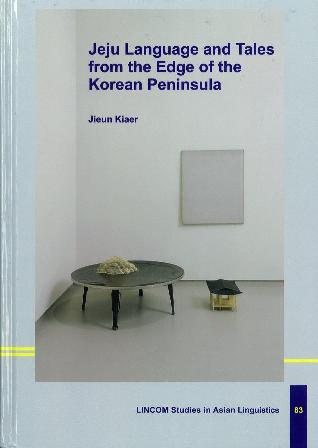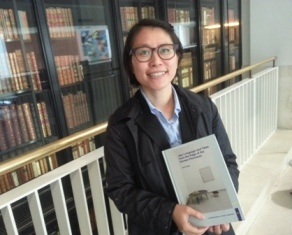| |
 |
|
| ▲ Jeju Language and Tales from the Edge of the Korean Peninsula published by LINCOM Studies in Asian Linguistics 2014. |
“How can you ignore your own language? It is a hidden treasure.”
Jieun Kiaer is a lecturer in Korean language and linguistics at the University of Oxford and her book, “Jeju Language and Tales from the Edge of the Korean Peninsula,” was published in 2014 as the first international English publication to cover the Jeju language and folk tales.
The bulk of the book, in addition to introductory sections on Jejueo grammar and vocabulary, comprises Jeju folk tales as taken from hitherto unpublished 1980s audio recordings held by Professor Kang Yeongbong at Jeju National University. Kiaer uses the tales to keep the language culturally embedded in what is intended as a foundational text for international linguists and anthropologists.
The folk tales are presented in five themes such as “Jeju Places” and “Wise Animals,” and each is prefaced by an introduction followed by the tale itself in Jejueo, Korean and English. Each section ends with a short glossary of Jejueo vocabulary.
Kiaer concedes that the rich color of the Jeju language is difficult to reproduce even in Korean, and this is confounded when translating to English. Unfortunately this is evident in the often uninspiring prose which is not helped by the fragmentary nature of the extracts.
There are traces of Jeju’s genius, however, and joy is taken from the motifs of shape-shifting foxes and tigers, and the gods, goddesses and magic of the common folk.
“More than the specific stories I like the way it is spoken ... their love of nature, their love for the seas and their very gentleness, loving to live in harmony with nature,” said Kiaer, lamenting that the language and culture had suffered such a fate after the 1970s decrees of Park Chung-hee.
“The national policy was to kill dialects and promote standard Korean which made [dialect] speakers feel inferior... and I even spoke to one man in his 80s who said, ‘I would never teach the Jeju language to my children.’ “
The man had just won a competition for his Jeju language skills.
| |
 |
|
| ▲ Author Jieun Kiaer at the British Library, London. Photo by Darren Southcott |
Such experiences inspire Kiaer to continue working for a gradual “reawakening,” which she already sees among her students at Oxford, linking this to the rise of Korean pop culture which “triggered people to know more about the real Korea.”
The book thus seeks to slake an increasing thirst, although Kiaer stresses her introduction is consciously “not overly academic.” She even questioned whether, as a non-native to Jeju, she was the right person to write it. “Someone has to do it,” she ultimately concluded.
In one of the tales, “The Grateful Frog,” a young girl sits grooming herself before she is due to be sacrificed. Melancholy, she ponders: “I will be dead in a few days, what point is there in brushing my hair?”
With little hope for the future, she is then miraculously saved by a kindly frog.
Much like the little girl, Jejueo faces an uncertain future, and bar animistic intervention, it is linguists such as Kiaer who are seeking to stave off the seemingly inevitable
Jeju Language and Tales from the Edge of the Korean Peninsula. ISBN 9783862885527 (Hardbound). LINCOM Studies in Asian Linguistics 83. 340pp. 2014 |





















